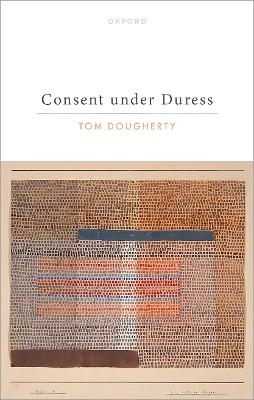
Consent under Duress
Oxford University Press (Verlag)
978-0-19-892233-9 (ISBN)
- Noch nicht erschienen (ca. Dezember 2024)
- Versandkostenfrei
- Auch auf Rechnung
- Artikel merken
Consent can make actions morally permissible. But consent can be deprived of its moral force when it is given under duress. Understanding how this happens requires answering the question of which types of duress undermine consent. It is uncontroversial that severe coercion, like threats of violence, can prevent consent from creating moral permissions. But what about minor duress? Duress from natural causes? Duress from social norms? Duress that is merely apparent to the consent-giver with no objective basis in reality? To answer these questions, Consent under Duress defends an account that follows two key approaches. First, it adopts an expansive approach that broadens the class of misconduct that is constituted by acting on someone's consent that is given under duress. Second, it adopts a scalar approach that allows that consent can be invalidated to varying degrees, which in turn can track the degrees of the severity of the duress to which the consent-giver is subject. The expansive and scalar approaches work in tandem. Once there is an expansion of the aforementioned class of misconduct, additional theoretical resources are needed to draw moral distinctions within this heterogeneous class. By providing these resources, the scalar approach supplements the expansive approach. Meanwhile, once it is recognized that consent can be partially invalidated by minor duress, it is necessary to expand the class of what constitutes misconduct that is constituted by acting on someone's consent that is given under duress. By developing independent arguments for these mutually reinforcing approaches, Consent Under Duress offers a robust defense of their combination.
Tom Dougherty is a Professor of Philosophy at the University of North Carolina at Chapel Hill. Previously, they have been a lecturer at the University of Cambridge, a lecturer at the University of Sydney, and a post-doctoral scholar at Stanford University. They received their PhD in Philosophy from the Massachusetts Institute of Technology. They are the author of the book, The Scope of Consent, and multiple articles on consent and other areas of moral, political, and legal philosophy.
Introduction
Part 1. Duress from the consent-receiver
1: Why does duress undermine consent?
2: The Consent-Receiver Principle
3: Emotional duress, paradoxical proposals, and exploitation
Part 2. Degrees of duress
4: The Problem of Minor Duress
5: The Constraint Solution
6: The Ameliorative View
Part 3. Duress from third parties, natural causes, and social norms
7: Third-party duress
8: Duress from natural causes
9: Duress from social norms
Part 4. Uncertainty about duress
10: In defense of the Subjective Principles
11: Against the Intention, Causal, and Epistemic Principles
Conclusion
| Erscheint lt. Verlag | 31.12.2024 |
|---|---|
| Verlagsort | Oxford |
| Sprache | englisch |
| Maße | 138 x 216 mm |
| Themenwelt | Geisteswissenschaften ► Philosophie ► Ethik |
| ISBN-10 | 0-19-892233-7 / 0198922337 |
| ISBN-13 | 978-0-19-892233-9 / 9780198922339 |
| Zustand | Neuware |
| Informationen gemäß Produktsicherheitsverordnung (GPSR) | |
| Haben Sie eine Frage zum Produkt? |
aus dem Bereich


